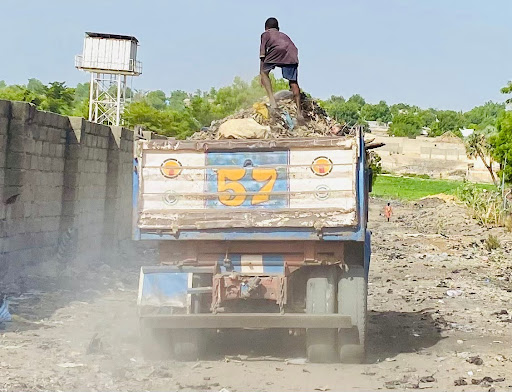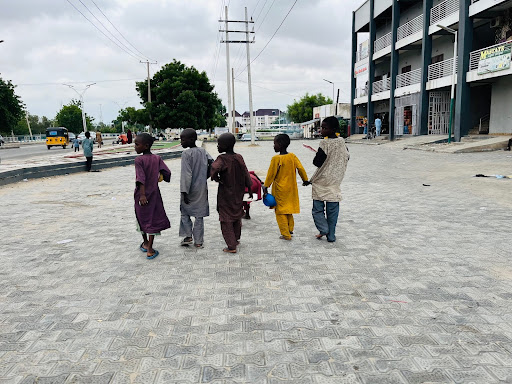Broken, Shaped by War: The Scavenging Children of Borno
Scavenging through ruins and surviving on scraps, these children in Borno State are shaped by war, displacement, hunger, and societal neglect.

It’s 1:00 p.m., and the sun in Maiduguri, North East Nigeria, scorches without mercy – too hot to stand still and too bright to keep eyes open. Under the blistering heat, however, children clutch their bowls tightly, roaming the streets for food.
When it rains, they shiver violently, teeth clattering loud enough to be heard from several feet away, their stomachs rumbling, their eyes scanning for anything edible. With bleeding heels and limps from split soles, their skin looks cracked during the harmattan. They often wander around, drifting through dumpsites with empty bowls or plastic bags clutched to their sides.
At fast food joints, they watch others eat, swatting flies from their eyes and the corners of their mouths, waiting for crumbs or spilt leftovers. By nightfall, they curl under bridges or behind kiosks, sleeping beneath shop awnings, or wherever a patch of shadow might pass for shelter.
They survive on dumpsites and gutters, scavenging for scraps, stretching out their palms to uninterested pedestrians, and knocking on car windows with quiet pleas. Some chant, some mumble, and some say nothing at all. It rarely makes a difference; most of the time, no one listens.
HumAngle has spoken to scores of children uprooted and shaped by the Boko Haram insurgency in the northeastern region. Broken and disadvantaged, many of these children say they resort to scavenging at dumpsites to survive, searching through refuse to feed themselves and support their families.

Twelve-year-old Ibrahim Ali, one of the scavenging boys HumAngle interviewed, returns with some metal scraps from a day-long exploration. “I always look for metal scraps that I can sell to support my family,” Ibrahim said. “On a good day, I find three to four kilos of metal that I sell for ₦300 per kilo. But on normal days, I get less than that. Sometimes I may end up without getting any scraps worth selling.”
The Boko Haram conflict unravelled the social safety net entirely. It swelled the ranks of the homeless, turned children into scavengers, and broke the links between family, education, and protection. When two cases of child abuse surfaced recently in the media, the public had a rare glimpse into the routine violence many children silently endure. The first involved a schoolgirl caught plucking mangoes, who was beaten with fists and kicks by the tree’s owner. The second was a video that emerged from a Tsangaya school: a boy stripped shirtless, doused with water, sand poured over him, and lashed mercilessly by his teacher.
The backlash was swift. The teacher was arrested. The state awarded the boy a scholarship. There was outrage. There were hashtags. However, the troubles facing children caught up in war zones are far more disturbing; the future of many of them is held to ransom by terrorists, ruining lives and properties in the suburbs of Borno state.
Bama, for instance, was once a bustling commercial hub, a critical trade link for merchants from Cameroon and neighbouring Nigerian states. But in 2014, it became the first major town to fall to Boko Haram. What followed was the collapse of life as it had once been. When the military reclaimed the town, a deepening humanitarian crisis emerged. Today in Bama, children roam the streets. Many have no idea where their parents are or what it means to be cared for.

These gaps in protection are realities carved into the lives of children like Adamu and Bala, who are forced to navigate survival without the support of family.
Adamu is just 10 years old, yet he carries himself with the hollowed, guarded manner of someone much older. He lives alone in a displacement camp in Bama, a place originally meant to provide safety, but where no one takes responsibility for him. “I don’t know who my parents are,” he said quietly, avoiding eye contact. “I just sleep anywhere in the camp. Sometimes near the fence, or by the market sheds.”

At sunrise, he sets out for Bama town, wandering in search of food. “In the morning, I go to town to beg. That’s how I survive,” he said.
In Konduga, 12-year-old Bala lives a different but equally difficult life. He shares a shelter in the IDP camp with his mother and two younger brothers, but the conditions are dire. “We don’t have food,” he said. “I beg on the streets to eat.” His father disappeared years ago, and Bala doesn’t know whether he’s alive or dead. Now, as the oldest child, he bears a responsibility far beyond his age, providing for his family.
Both boys are among the estimated 2.6 million internally displaced persons (IDPs) in Borno, more than half of whom are children. Despite the scale of the need, investment in education remains limited. Between 2020 and 2023, the Education Cannot Wait (ECW) initiative allocated US$20.1 million to support nearly 2.9 million children across Borno, Adamawa, and Yobe. In 2024, it pledged another US$15 million to reach over 130,000 more.

“We cannot talk about algebra when they haven’t eaten,” said Mohammad Bunu, an educationist working with displaced and vulnerable children in northeastern Nigeria. The real crisis isn’t infrastructure; it’s the disconnect between formal education models and the survival realities of children in camps and communities, he said.
Bunu calls for a shift toward community-based education that combines basic literacy with vocational training, such as carpentry, tailoring, agriculture, and technology. “They need a path beyond begging or just attending school. Reintegration isn’t only for ex-combatants. We must invest in skills that restore dignity.

Longkat Enock, a clinical psychologist, adds that education must have structured emotional support. “You can’t heal a broken society if you ignore its broken children,” he warned. “They’ve seen killings, starvation and abandonment, yet no one asks how they feel.”
Longkat advocates for trained counsellors, safe spaces, and mentorship. “If we keep acting like food and books alone are enough, we’ll be here again in ten years, facing even more shattered futures.”
“We’re not just talking about children missing school, we’re talking about children missing entire stages of development,” said Bunu. “In many of these camps, there’s no structure, no routine, no trained teachers. It’s impossible to talk about rebuilding a society without rebuilding its education system first.”
The coordinators of a makeshift displacement camp at the Government Day Science Secondary School (GDSSS) in Bama say they host over 109,000 people, including more than 64,000 children.
When HumAngle visited the GDSSS school within the camp, the classrooms were empty, and only five teachers were present. “We don’t have more than 50 pupils attending class regularly,” one teacher said.
“When these boys grow up without any care, what will they turn into?” asked Bulama Abdu, a community elder in Bama. “We suffered from one generation of angry boys with guns. Are we raising another?”
“Conflict doesn’t end by hosting displaced people at camps or even back to their communities. If children are left without education, stability, or guidance, the trauma festers. They become vulnerable to criminality, violence, even new forms of extremism,” Enock added.
This concern is similar in post-conflict zones. In South Sudan, neglected war-affected youth became prime targets for militia recruitment. In post-war Liberia, years of childhood abandonment fed into cycles of urban violence. The Nigerian government has refused to articulate a long-term reintegration and education policy specifically targeting children displaced or affected by the Boko Haram conflict.
Reintegration efforts in the northeastern region largely prioritise ex-combatants, neglecting civilian victims and displaced children. Education-in-emergencies programs, such as learning centres for orphans, remain donor-dependent and limited in scale. Just 27 per cent of school-aged children in humanitarian response plans have received adequate education support, leaving the vast majority without access.
Health educators note that many Nigerians resist birth control on religious grounds. One family-planning counsellor explained that when the term for “family planning” (literally “limiting birth”) was introduced in Hausa (“Kaiyadde Iyali”), people instantly objected, asking, “Who are you to limit birth?”. They cite Qur’anic teaching that “Allah will provide for all children.” Many of them see large families as divinely ordained and avoid family planning on faith-based grounds.
Traditional socioeconomics also favour big families. In rural northern society, women live mostly at home and rely on children for chores and farm work. Children thus serve as household labour and social security. Having many sons or daughters brings status and assistance.
When HumAngle randomly spoke to some young persons in Maiduguri, the sentiment was nearly unanimous: family planning is perceived as a Western concept, alien to their values. Most respondents said they desired at least eight children, with several aiming for ten or more. “It is God who takes care of children,” said one of the young men. “Every child comes with their destiny. If he makes it, he will make it. If not, nothing the parents do will change that.”
For 27-year-old Adamu Ali, fathering ten children is part of his plan. “At least five of them will grow up to look after me when I’m old,” he said with conviction. His rationale is not uncommon in most northern communities where the collapse of formal social safety nets has reinforced the reliance on children as a form of long-term security.
UNICEF reports that Borno has one of Nigeria’s highest out-of-school rates, as roughly 1.8 million children lack access to schooling. A study found that conflict-affected women showed increased preference for larger families, viewing “more children as a coping strategy amid insecurity, seeking enhanced social and economic security, or replacing lost members during the conflict”.
In other words, families often cling to the belief that God will provide for any children they have, even when resources vanish. Humanitarian workers and relatives thus become the de facto caregivers for these unplanned generations, as villagers insist on growing their families in the hope of divine provision.
The ongoing boko haram conflict has shattered traditional support systems. Where once extended families or religious communities would help raise children, displacement and poverty have made that impossible.
“We don’t plan children,” said Hajja Fatima, a 45-year-old widow in Maiduguri raising six children alone. “That is God’s work. If he gives, you take.”
Children in northeastern Nigeria, displaced by the Boko Haram conflict, face dire survival challenges. Many, like twelve-year-old Ibrahim Ali, resort to scavenging for scrap metal to support themselves and their families. The insurgency has destroyed the social safety net, leaving countless kids homeless and disconnected from family and education. Despite efforts by initiatives like Education Cannot Wait, the education sector remains strained with a lack of adequate resources and facilities.
The situation is compounded by cultural norms that favor large families, often without considering sustainable support. Many families rely on religious beliefs, trusting that God will provide for their children. Overall, the conflict's impact on children is severe, with many facing hunger, homelessness, and lack of emotional and educational support, threatening their futures and the region's stability.
Support Our Journalism
There are millions of ordinary people affected by conflict in Africa whose stories are missing in the mainstream media. HumAngle is determined to tell those challenging and under-reported stories, hoping that the people impacted by these conflicts will find the safety and security they deserve.
To ensure that we continue to provide public service coverage, we have a small favour to ask you. We want you to be part of our journalistic endeavour by contributing a token to us.
Your donation will further promote a robust, free, and independent media.
Donate HereStay Closer To The Stories That Matter




